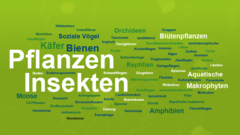Official kickoff of the Center for Biodiversity and Integrative Taxonomy [04.12.21]
More than 50 researchers share their visions and approaches to protect species knowledge at the internal KomBioTa kickoff

The internal kick-off of KomBioTa showed how diverse the taxonomic expertise needed to save species knowledge in KomBioTa already is today. This is encouraging for an optimistic view into the future of biodiversity!
In December, more than 50 scientists joined the Center for Biodiversity and Integrative Taxonomy (KomBioTa) and met for the first time within an online kickoff event. Their goal: an intensive exchange about common goals and overlaps in scientific work as well as the development of joint ideas for the future of biodiversity.
In the approximately three-hour online meeting, the board members of KomBioTa – Prof. Dr. Johannes Steidle, Prof. Lars Krogmann and Prof. Hasselmann – and the KomBioTa Office introduced themselves and their visions. Dr. Ann-Catrin Fender, the KomBioTa managing director since 2021, spoke about the central challenges of the competence center and outlined how KomBioTa would like to approach their implementation in an active research and communication network.
A short presentations of every researchers made the enormous range of scientific topics visible which KomBioTa is already conducting. The experts are working on current research questions from a broad spectrum of agricultural, natural and social sciences – across numerous taxonomic groups from microorganisms, insects, mammals and birds to various plant groups including crops as well as on different spatial scales from the molecular to the landscape level.
The central goal is to increase the coverage of occurrences and the resulting picture of the evolution of the todays flora and fauna, as well as to maintain expertise as an essential prerequisite for species conservation. This requires independent basic and applied research, high-quality educational opportunities, and the involvement of citizens and volunteers through broad-based citizen science projects and public outreach.
The task now is to flesh out the research and education projects and advance the central concern of species conservation (knowledge), and thus the species themselves.
Back to Latest News